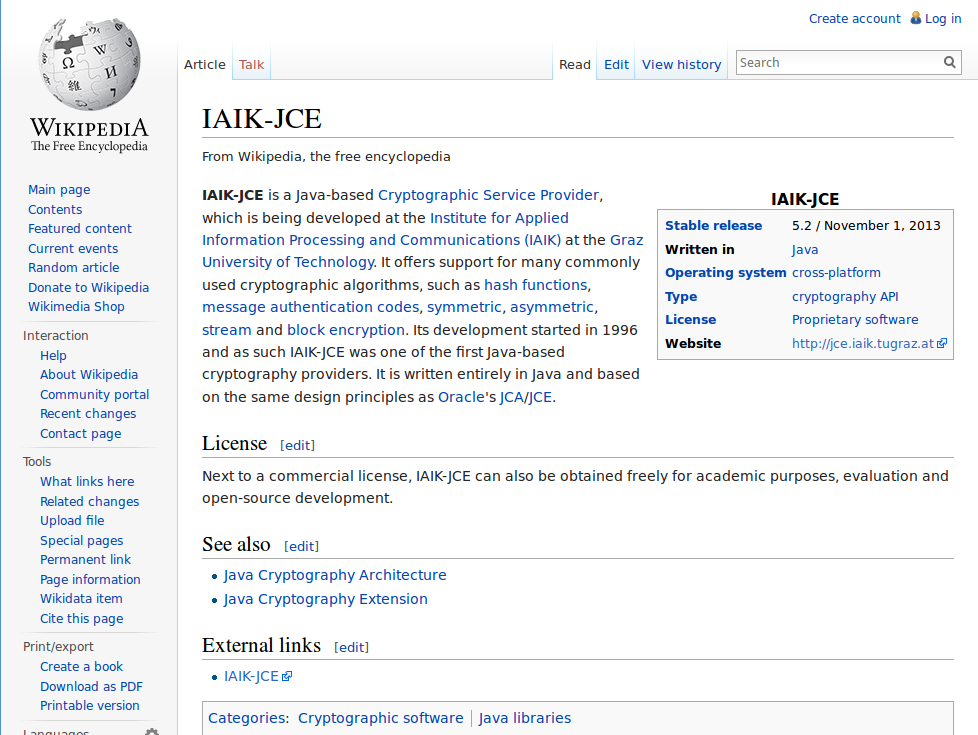IAIK JCE in Jython
… cause cryptographic algorithm's extensibility is important
Lukas Prokop, pygraz, Nov 2014
Jython?
- python on the JVM
- Primary target is a complete implementation of python (CPython compatibility)
- python 2.6 is stable. python 2.7 in second beta
- python → Java byte code → JVM execution
Jython!
- jython.org
- Actual multithreading; no GIL!
- python3? We are not there yet
- jython as a simple jar file
Example command line
java -cp "iaik_jce_full.jar:jython-standalone-2.7-b2.jar" \ org.python.util.jython file.py
Cryptography in Java
Accelerating cryptography
- MD5 got broken (2004–2013).
- RSA-768 [768 bit keylength] was the latest RSA record (2009).
- Erich Wenger and Paul Wolfger of IAIK recently solved the discrete logarithm problem on a 113-bit Koblitz curve (May 2014).
If a vulnerability is published, exploits occur fast.
Considerations
Are your crypto algorithms implemented properly?
Who fixes published vulnerabilities in your software stack? How fast?
Whom do you trust not to screw up?
Do you trust Sun?
Do you trust the Python Software Foundation?
Let's make algorithms exchangable!
A developer's usecases
- Generate keys (PRNGs, public/private keys, …)
- Encrypt data
- Decrypt data
- Hash & Sign data
- Verify data
- Get an instance of your cryptosystem
- Use an uniform interface for your operation(s)
Crypto software vendors
Java (JCA):
- Sun
- Bouncy Castle
- IAIK JCE
Crypto software vendors
Python:
| Python Software Foundation | hashlib |
| Dwayne C. Litzenberger, et al | pycrypto |
| several volunteers | cryptography |
| [NaCl:] djb, Tanja Lange, Peter Schwabe | pynacl |
[Security, Security::Cryptography] matches 333 packages
(as of Aug 2014)
Here: IAIK-JCE

Here: IAIK-JCE

It even has a Wikipedia article 😀
Hash a file (with hashlib)
import hashlib s = hashlib.sha1() with open('filetohash') as fp: s.update(fp.read()) print(s.hexdigest()) # prints eg. c4f8cca53c9c0734489b9640eee2fdcd52fd80fe
Hash a file (with sha1sum)
$ sha1sum filetohash c4f8cca53c9c0734489b9640eee2fdcd52fd80fe filetohash
Hash a file (with IAIK-JCE)
import iaik.security.provider.IAIK from java.security import MessageDigest iaik.security.provider.IAIK.addAsProvider() filepath = 'filetohash' d = MessageDigest.getInstance("SHA-1") with open(filepath, 'rb') as fp: d.update(fp.read()) hexrepr = ['{:02x}'.format(b % 256) for b in d.digest()] print(''.join(hexrepr))
List providers
import java.security.Provider from java.security import Security import iaik.security.provider.IAIK iaik.security.provider.IAIK.addAsProvider() for provider in Security.getProviders(): print("Name : {}".format(provider.getName())) print("Information : {}".format(provider.getInfo())) print("Version : {}\n".format(provider.getVersion()))
… Name : IAIK Information : IAIK Security Provider v5.2, evaluation version Version : 5.2 Name : SUN Information : SUN (DSA key/parameter generation; DSA signing; SHA-1, MD5 digests; SecureRandom; X.509 certificates; JKS keystore; PKIX CertPathValidator; PKIX CertPathBuilder; LDAP, Collection CertStores, JavaPolicy Policy; JavaLoginConfig Configuration) Version : 1.7 Name : SunRsaSign Information : Sun RSA signature provider Version : 1.7 Name : SunJSSE Information : Sun JSSE provider(PKCS12, SunX509 key/trust factories, SSLv3, TLSv1) Version : 1.7 Name : SunJCE Information : SunJCE Provider (implements RSA, DES, Triple DES, AES, Blowfish, ARCFOUR, RC2, PBE, Diffie-Hellman, HMAC) Version : 1.7 Name : SunJGSS Information : Sun (Kerberos v5, SPNEGO) Version : 1.7 …
List algorithms
See standard names list
import java.security.Provider from java.security import Security import iaik.security.provider.IAIK iaik.security.provider.IAIK.addAsProvider() prov = iaik.security.provider.IAIK() for service in prov.getServices(): print('Algorithm : {}'.format(service))
… Algorithm : IAIK: SecureRandom.SHA1PRNG -> iaik.security.random.SecRandomSpi$SHA1RandomSpi Algorithm : IAIK: SecureRandom.SHA384PRNG -> iaik.security.random.SecRandomSpi$SHA384RandomSpi Algorithm : IAIK: SecureRandom.SHA512PRNG -> iaik.security.random.SecRandomSpi$SHA512RandomSpi … Algorithm : IAIK: MessageDigest.KECCAK224 -> iaik.security.md.KECCAK224 aliases: [KECCAK-224] Algorithm : IAIK: MessageDigest.KECCAK256 -> iaik.security.md.KECCAK256 aliases: [KECCAK-256] Algorithm : IAIK: MessageDigest.KECCAK384 -> iaik.security.md.KECCAK384 aliases: [KECCAK-384] Algorithm : IAIK: MessageDigest.KECCAK512 -> iaik.security.md.KECCAK512 aliases: [KECCAK-512] … Algorithm : IAIK: KeyPairGenerator.DH -> iaik.security.dh.DHKeyPairGenerator aliases: [DiffieHellman, Diffie-Hellman, 1.2.840.113549.1.3.1] … Algorithm : IAIK: SecretKeyFactory.RC6 -> iaik.security.cipher.GeneralKeyFactory …
Hashing a password
Visit to Importland
import java.security.Provider import iaik.security.provider.IAIK import java.security.SecureRandom as SecureRandom import java.security.spec.KeySpec as KeySpec import javax.crypto.SecretKey as SecretKey import javax.crypto.SecretKeyFactory as SecretKeyFactory import javax.crypto.spec.PBEKeySpec as PBEKeySpec import javax.crypto.spec.SecretKeySpec as SecretKeySpec import jarray import sys
Generating salt
# making SHA512PRNG available iaik.security.provider.IAIK.addAsProvider() def generateSalt(): # SecureRandom might take very long reading from /dev/random salt = jarray.zeros(20, "b") rand = SecureRandom.getInstance("SHA512PRNG") rand.nextBytes(salt) return salt
Hashing
def hashPassword(pwd, salt): pbkdf2 = SecretKeyFactory.getInstance("PBKDF2WithHmacSHA1") spec = PBEKeySpec(pwd, salt, 65536, 128) presecret = pbkdf2.generateSecret(spec) secret = SecretKeySpec(presecret.getEncoded(), "AES") return secret.getEncoded()
Using the interface
if __name__ == "__main__": salt = generateSalt() pwd = hashPassword("MyVerySecr!tP4ssworD", salt) # store {salt, pwd} in database userlogin = "MyVerySecr!tP4ssworD" pwd2 = hashPassword(userlogin, salt) # verification if pwd == pwd2: print("User has been authenticated") else: print("User login failed") sys.exit(1)
😊 Thanks!